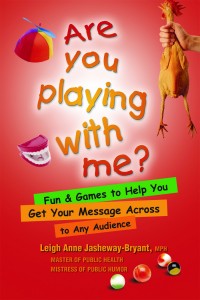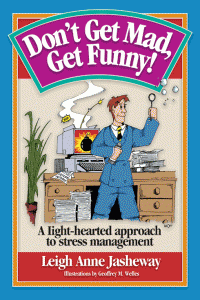Play – Just for Kids?
By Leigh Anne Jasheway
From Are You Playing with Me?
What three little words have the power to make you smile and fill you with the hope that maybe today won’t be so bad after all? Words you probably said and heard hundreds of times when you were a child but somehow forgot as you got all grown-up and professional? Words that almost always brought a smile to your face then and could do the same thing today if you let them.
Ready? Those three little words are: “Can you play?”
Remember when you were young and a kid would show up at your door and ask “Can you play?” It was exciting and fun. It meant you had a friend, and you could finally get out of the house, away from the stuffy grown-ups! If you’ve forgotten just how magical those three words can be, stand outside an elementary school during recess and listen to the giggles, the songs, and the shouts of glee coming from the playground. When was the last time you felt the urge to make joyful noises so loud they could be heard down the block? And as a presenter or trainer, when was the last time you were able to help any group of people feel that way? A few weeks ago? A year? Never?
Play isn’t kids’ stuff. It’s a vital way of bonding with other people, of communicating messages that get remembered, and of leaving a good lasting impression. Unfortunately, in our rush to grow up and get serious, we forget how a playful attitude can make almost anything easier. People who speak and teach for a living forget this lesson too. That’s why so many of them stand behind a podium and lecture with PowerPoint – or as I call it “I’m not interesting, look at this slide!” But unless the point of your lecture is to bore your audience to tears or drive them to spend their time secretly text messaging the office on their Blackberries or cell phones, there are better ways to get a message across.
Maybe I’m biased. The first time I gave a “speech” was in tenth grade Speech Class at Abilene High School. Rather than stand at the lectern the teacher had set up, I hopped on the table and sat in the lotus position. (This was back in the days when I could actually still get out of the lotus position without having to call the paramedics to use the Jaws of Life to pry my legs loose.) The rest of the class learned more about my topic and probably remembered it longer than had I just read some statistics off note cards like everyone else did that day. And there may still be people talking about my audacity lo these many years later.
During the past fifteen years of my life as a speaker, trainer, and humorist, I’ve had the chance to develop a deep sense of appreciation for the power of fun and play among audiences of all sizes, shapes,and levels of seriousness. I’ve played with doctors, nurses, teachers, bus drivers, librarians, engineers, forest managers, loggers, bankers, scientists (yes, even rocket scientists!), cat rescuers, dentists, nursing home residents, interior decorators, insurance agents, dance moms, newspaper reporters, screenwriters, pastors, HR directors, medical assistants, and postal workers (none of whom went postal on me). I’ve played with people who warned me in advance that they weren’t very playful. People who thought they were too stressed out to relax. Even people who were very, very afraid of letting their inner child out for fear the inner adult would run away and join the circus. A playful approach has always worked. Sometimes it works better than other times, but it always works better than just talking to them ad nauseum until their ears bleed.
Now you may be thinking, “That fine if you’re talking about something that’s fun, but I’ve got to teach my audience about global warming/organizational restructuring in the credit union industry/programmable customization models for the disgruntled end users who insist on speaking English. I can’t make that fun, can I?”
The quick answer is yes. When I first started using games and play to help educate and enlighten, I was teaching stress management, nutrition, fitness, smoking cessation, and AIDS prevention. I’d been teaching these subjects and having experts come in to to speak about them for years before I decided I needed to lighten up the messages. I mean, how many times can you hear “Exercise three times a week for thirty minutes” before you want to throw barbells at someone (if you’re strong enough to, that is)?
Believe me, the people who were still smoking after years and years of being lectured to, really didn’t want to even be in the same room with me. I remember that right after deciding to integrate humor into my health education approach – creating game shows, using the old Saturday Night Live “Whiners” sketches, using improv games, etc. – I took my show on the road to – a prison! I know, I get all the good gigs.
My job was to teach a group of prisoners why and how to stop smoking. It was a small room and I was the only woman in it. If not for a playful attitude and fun approach to the topic, both of which distracted the guys from their nicotine fits, I’d probably still be there or at least have a nice prison tattoo.
My experience has shown me that even serious topics can use a little fun around the edges – to break the tension, to help the audience feel more comfortable asking questions, even to help you get out alive. Even if you don’t think the topic lends itself to being playful, you can wedge the important, serious stuff in the middle of more light-hearted games. Think of it as the Oreo™ cookie approach to presentations. No matter what topic I’m presenting, I always adhere to Bob Basso’s philosophy that “If it’s not fun, you’re not doing it right.” I think audiences know that intuitively, even if they can’t put it into words. No matter what you have to say, if the people listening have fun, enjoy each other and you, and are in a playful spirit while there, your message will be better received. Not to mention that if your audience doesn’t fall into a coma, they will learn more and remember more of what you had to say.




